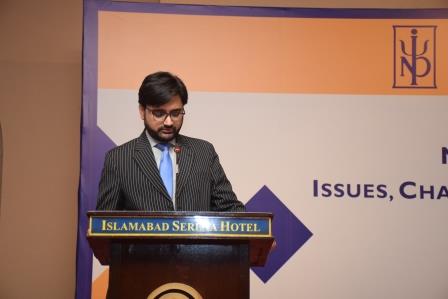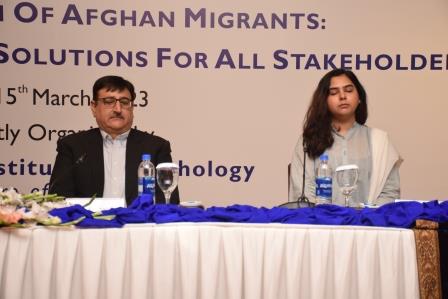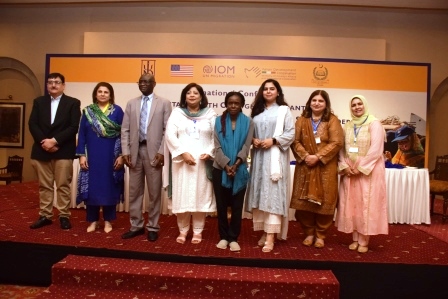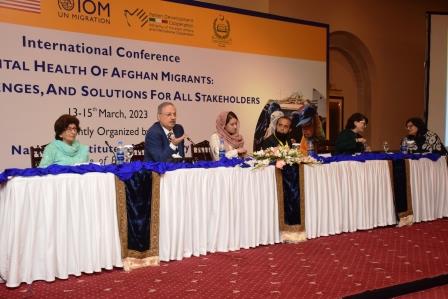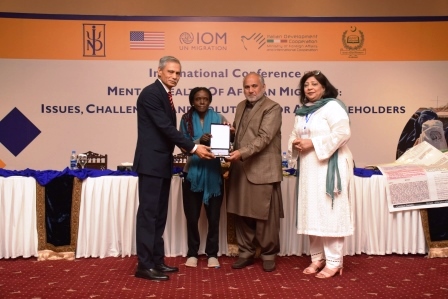National Institute of Psychology (NIP), Quaid-i-Azam University and International Organization for Migration (IOM) jointly organized International Conference on “Mental Health of Afghan Migrants: Issues. Challenges and Solutions for All Stakeholders” on 13-15th March 2023 in Serena Hotel, Islamabad. This conference was conceptualised by IOM Pakistan, and executed by National Institute of Psychology, Quaid-i-Azam University. It included productive and engaging discussions spanned over three days. First two days were based upon pre-conference workshops. For pre-conference workshop related details go to Pre-Conference Workshops section.
Third day of the Conference (15th March 2023) in Sheesh Mahal Hall, Serena Hotel, was focused at recognizing the significance of addressing the mental health needs of Afghan migrants who have faced unimaginable hardship, displacement, and trauma. This event was a testament to collective commitment in promoting mental health and well-being, especially in the context of forced migration and displacement. Aim was not only to enhance understanding of the mental health needs of Afghan refugees and explore innovative approaches to addressing these needs, but also to promote collaboration, knowledge-sharing, and capacity-building among stakeholders, including refugee communities, healthcare providers, and policymakers. Attention was not only focused at issues and challenges that Afghan migrants that they are facing in Pakistan but also challenges that host communities and institutions are encountering in hosting new entrants with unique needs in their cultural context.
Conference was very well-attended by 315 participants. Among these, 75 were men and 240 were women. Professionally, 40 health providers, 62 from IOM, 55 from NGOs, 70 Higher Education Students 70, and 93 Psychologists attened the conference. They were from Capital & Punjab (n = 180) and Other Provinces including AJK (n = 135).
It was an exciting journey of keynotes, guest speeches, panel discussions, and poster presentations. It was urged to approach the conference with an open mind, a spirit of collaboration, and a commitment to meaningful action. All stakeholders who participated were willing to make a difference in the lives of Afghan refugees and contribute to a more just, equitable, and compassionate world. See details of speakers and panelists in Guest Speakers section.
Conference day on 15th March 2023 started with Inaugural Ceremony where Mr. Faridullah Jan (Commissioner, Commissionerate Afghan Refugees) graced the occasion as Chief Guest along Ms. Mio Sato (Chief of Mission, IOM), Dr. Rubina Hanif (Chief Organizer, Director NIP), and Dr. Marsela Nyawara (Emergency Health Officer). Dr. Humaira Jami (Organizer, Assistant Professor NIP) convened the conference proceedings. She introduced the participants about conference objectives and activities. Ms. Mio Sato and Prof. Dr. Rubina Hanif welcomed the participants on behalf of organizing institutes and shared their vision about the conference. Mr. Faridullah Jan appreciated the aims and objectives of the conference and stressed upon organizing such events at provincial level as well.
Three keynote speakers including Sher Jan Ahmadzai (Director, Center for Afghanistan (and Regional) Studies at the University of Nebraska at Omaha, USA), Prof. Dr. Muhammad Jahanzeb Khan, (Vice Chancellor, FATA University; President Pakistan Psychological Associtaion), and Ms. Tammi Sharpe (Deputy Representative, UNHCR) discussed migration process and its impact mental health of Afghan Migrants in host communities. They shared existing practices and recommendations for providing healthcare services at primary, secondary, and tertiary level to meet unique mental health needs in Pakistan’s developing context.
Dr. Salma Malik (Assistant Professor, Department of Defence and Strategic Studies, Quaid-I-Azam University, Islamabad) as guest speaker highlighted plight of Afghan women, seeking refuge and migrated in post 2019 scenario, and what measures need to be undertaken by Pakistan to help address the issues and impediments involved. In context of dearth of specialist resources and multifaceted challenges involved in providing mental healthcare in Pakistan, the Ministry of Planning, Development and Special Initiatives developed a digital model for providing Mental Health and Psychosocial Support (MHPSS) in 2021. Dr. Asma Humayun (National Technical Advisor) shared the proposed model and how it can be used mental health support of Afghan Refugees. Political and socio-economic context of mental health, challenges, and issues and their impact on mental health were discussed by Prof. Dr. Zafar Nawaz Jaspal (Director, School of Politics and International Relations, Quaid-i-Azam University, Islamabad) and Dr. Malik Hammad Ahmad (Director, Ministry of Human Rights).
There were two intellectual interactive talks in terms of panel discussion. One was purely focused on “Structural and Social Determinants of Mental Health of Afghan Migrants”. Panellists Dr. Pervez Shaukat (Public Health Officer, UN), Ms. Maymoona Saadi (Consultant Psychologist WHO), Dr. Inoussa Kabore (Deputy Representative, UNICEF), Dr. Shabana Fayyaz (Chairperson, Department of Défense and Strategic Studies, Quaid-i-Azam University) reflected upon issues and challenges that are faced at institutional and structural levels while providing services to forcibly displaced individuals and meeting their essential needs. In other panel discussion, same as title of the conference “Mental Health of Afghan Migrants: Issues, Challenges and Solutions for All Stakeholders” mental health practitioners were invited to discuss various mental health problems that migrants come across because of displacement, trauma, and violence. Panellists particularly focused at problems faced by women and youth and also considered region based experiences and mental health outcomes in this context. Dr. Rizwan Taj (Dean, Pakistan Institute of Medical Sciences), Dr. Iftikhar-u-Nisa Hassan (Ex-Director NIP), Ms. Naveen Hashim (Founder Afghan-Pak Women Association), Dr. Syed Aziz Agha (Assistant Prof., University of Balochistan, Quetta), and Ms. Zeba Husain (Director, Mashal Trust) were the panellists. Solutions were suggested and recommendations were made.
We had 32 submissions for poster presentations. Thirty presenters were able to reproduce and share their work in the conference. These posters were displayed throughout the conference day. Dr. Marsela Nyawara (Emergency Health Officer IOM), Prof. Dr. Tanvir Akhtar (President NIP Alumni Association), and Prof. Dr. Iffat Batool (Foundation University) were evaluators to decide three best posters explaining mental health of migrants in different contexts.
In concluding ceremony, Dr. Humaira Jami provided an overview of the conference and recommendations made throughout the conference. Overall, conference was well attended by 300 participants. Most of the participants were from the field of psychology, mental health, and health sciences. Region was more from Punjab (180) and female participants attended the conference. Dr. Mrasela Nyawara and Prof. Dr. Rubina Hanif thanked participants for attending the conference. Shields and certificates were awarded to three best posters by Prof. Dr. Muhammad Idrees (Dean, Faculty of Social Sciences QAU).
|
|





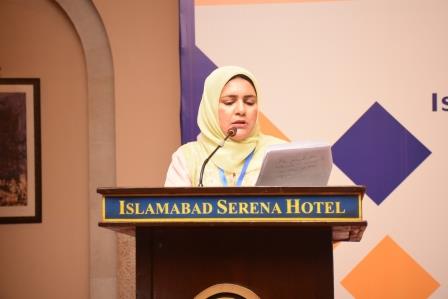














|





